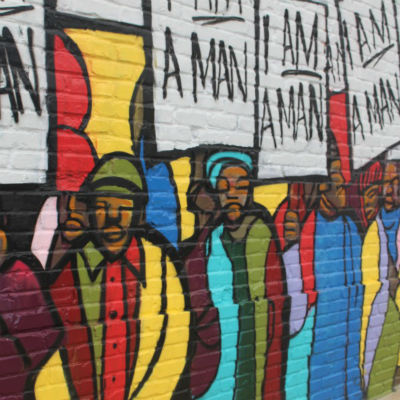The Wives of the Workers: A Shelter in the Storm
By Neil Earle

It still makes me shudder when I think of how Echol Cole, 36, and Robert Walker, 30, died. Carrying out their duties as sanitation workers on a rainy day in Memphis early in 1968, they sought shelter inside the mechanical packing unit of their trucks. Black workers were not allowed to seek refuge in the cabs or stores in the neighborhood.
We all know what happened next and the historic movement it provoked. “Their deaths were symptomatic of the disrespect with which garbage workers were treated,” writes Andrew Young. The resultant strike led 1300 sanitation workers to leave their jobs and picket the city to address some long-held grievances – no compensations, no medical insurance, no bereavement benefits. All for 63 cents an hour, $32 a month.
The “I Am A Man” posters are now part of the nation’s iconography, a key legacy of the 1960s civil rights movement that had already reshaped the nation. Emily Yellin retold that story in her documentary series 1300 Men for Theroot.com where it has received 7 million views so far.
But on the night of March 21st came something different. At the University Center River Room at the University of Memphis, the Benjamin L. Hooks Institute for Social Change hosted a panel discussion “The Wives of the Sanitation Workers Strike.” The meeting – chaired by Yellin – allowed three of the wives of the workers to tell their stories to an enthusiastic live audience.
“When the men went on strike so did their wives,” Yellin had reported earlier. “They were often the sole breadwinners during the strike, and the thing about the strike that you have to remember: Nobody knew the outcome…So every day of the 65 days of the strike was a day of uncertainty.”
In their quiet unpretentious way Jimmie Leach, Frances Ueal and Helen Turner shared their vivid reminiscences – of men coming home from a workplace where there were no showers, smelling of garbage, of having to comb the maggots out of their husband’s hair, clothes to be washed for the next day, their children having to endure the stigma of their dads being lowly “garbage men.”
 Emily Yellin
Emily Yellin“Who were the heroes?” Emily Yellin asked the panel. “They all were," came the near unanimous answer. “They all stuck together, they didn’t give up.”
The men had discussed the motion to strike with their wives ahead of time, realizing they would all be on the firing line. The ladies had their own action committee called WOMEN – “Women On The Move for Equality Now.” Helen Turner remembers the women meeting regularly to sing, pray, pass out food to the picketers, fold and pass out literature and generally encourage each other.
“When you get opportunity you begin to change with it,” Mrs. Ueal said. Jimmie Leach remembered the 400 national guardsmen the city had called in together with the tanks roaming the street of Memphis. It fell to them to keep the children focused away from the worst that could happen, as one of her sons had lamented “they’re not going to kill my daddy, are they?”
Tough times, indeed. “The devil gets busy when you’re trying to do something,” a striker commented during one of the film clips shown during the evening. “We were scared and proud all at the same time,” chimed in a panelist.
There’s nothing like a live audience for first-hand testimonies. Indeed, a clear non-verbal testament to the strong solidarity that suffused that spring of 1968 was the obvious warm and loyal support offered by the family members in the audience. Laughter punctuated the evening on March 21st as the ladies affirmed the need to “stand by their man” – a generational reflection of sorts for the diverse audience of nearly 300.
Hooks Institute Director Daphne McFerren put it very well in her summary. She saluted the lives of these remarkable women as “a bridge for the nation for our past, present and future in the call for a more just world.” This seems doubly true in a city such as Memphis where the long past lives on at almost every turn.
Neil Earle is a retired pastor who teaches history for Grace Communion Seminary online. His web site is asecondlook.info.